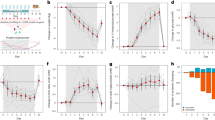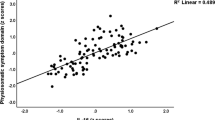Abstract
OBJECTIVE: To study health-related quality of life responses to marked weight loss in WHO Class II–III (body mass index (BMI) ≥35 kg/m2) obese men.
DESIGN: An 8 month randomised clinical trial with a 4 month weight loss programme (10 weeks on a very-low-energy diet (VLED) and 17 behaviour modification visits) in the treatment group and no intervention in the control group.
SUBJECTS: Nineteen men (mean age 45.9 y, mean BMI 39.3 kg/m2) in the treatment group and 19 men (47.2 y, 39.4 kg/m2) in the control group.
MEASUREMENTS: Weight and questionnaires measuring health-related quality of life (RAND 36-Item Health Survey 1.0 and obesity-related psychosocial problems scale).
RESULTS: In the treatment group, the mean (s.d.) weight loss was 17.0 (7.4)% at the end of the 4 month therapy. At the end of follow-up, nearly 6 months after the end of VLED in the treatment group, the average maintained weight loss was 13.9 (7.8)% of baseline weight. The control group was weight stable throughout the study. During treatment, there was only transient improvement in general health, bodily pain, mental health, emotional role functioning and vitality (all increases in the scores were not statistically significant). Improvements in physical functioning, social functioning and obesity-related psychosocial problems were maintained until the end of follow-up. The treatment group also reported improvement in perceived health in the past year. There was only minor fluctuation in questionnaire scores in the control group.
CONCLUSION: The short-term and maintained health-related quality of life effects of weight loss may differ. Marked weight loss in WHO Class II–III obese men leads to improvements in physical functioning, social functioning, obesity-related psychosocial problems, and perceived health; these improvements were maintained at 4 month post-intervention follow-up.
This is a preview of subscription content, access via your institution
Access options
Subscribe to this journal
Receive 12 print issues and online access
$259.00 per year
only $21.58 per issue
Buy this article
- Purchase on Springer Link
- Instant access to full article PDF
Prices may be subject to local taxes which are calculated during checkout





Similar content being viewed by others
References
Pi-Sunyer FX . Comorbidities of overweight and obesity: current evidence and research issues Med Sci Sports Exerc 1999 22(Suppl): S602–S608.
National Task Force on the Prevention and Treatment of Obesity . Overweight, obesity, and health risk Arch Intern Med 2000 160: 898–904.
Sullivan M, Karlsson J, Sjöström L, Backman L, Bengtsson C, Bouchard C, Dahlgren S, Jonsson E, Larsson B, Lindstedt S, Näslund I, Olbe L, Wedel H . Swedish Obese Subjects (SOS)-an intervention study of obesity. Baseline evaluation of health and psychosocial functioning in the first 1743 subjects examined Int J Obes Relat Metab Disord 1993 9: 503–512.
Han TS, Tijhuis MA, Lean ME, Seidell JC . Quality of life in relation to overweight and body fat distribution Am J Public Health 1998 88: 1814–1820.
LePen C, Lévy E, Loos F, Banzet MN, Basdevant A . ‘Specific’ scale compared with ‘generic’ scale: a double measurement of the quality of life in a French community sample of obese subjects J Epidemiol Community Health 1998 52: 445–450.
Lean ME, Han TS, Seidell JC . Impairment of health and quality of life in people with large waist circumference Lancet 1998 9106: 853–856.
Lean ME, Han TS, Seidell JC . Impairment of health and quality of life using new US guidelines for the identification of obesity Arch Intern Med 1999 159: 837–843.
Räikkönen K, Matthews KA, Kuller LH . Anthropometric and psychosocial determinants of visceral obesity in healthy postmenopausal women Int J Obes Relat Metab Disord 1999 23: 775–782.
Fine JT, Colditz GA, Coakley EH, Moseley G, Manson JE, Willet W, Kawachi I . A prospective study of weight change and health-related quality of life in women JAMA 1999 282: 2136–2142.
Doll HA, Petersen SE, Stewart-Brown SL . Obesity and physical and emotional well-being: associations between body mass index, chronic illness, and the physical and mental components of the SF-36 questionnaire Obes Res 2000 2: 160–170.
Brown WJ, Mishra G, Kenardy J, Dobson A . Relationships between body mass index and well-being in young Australian women Int J Obes Relat Metab Disord 2000 24: 1360–1368.
Fontaine KR, Cheskin LJ, Barofsky I . Health-related quality of life in obese persons seeking treatment J Fam Pract 1996 43: 265–270.
Barofsky I, Fontaine KR, Cheskin LJ . Pain in the obese: impact on health-related quality-of-life Ann Behav Med 1997 4: 408–410.
Kolotkin RL, Head S, Brookhart A . Construct validity of the impact of weight on quality of life questionnaire Obes Res 1997 5: 434–441.
Gutiérrez MAB, Martín ER, Garcia NT, Cuesta TS, Martin PG, Somolinos IC . Calidad de vida relacionada con la salud y obesidad en un centro de atencíon primaria Rev Esp Salud Pública 1998 72: 221–231.
Fontaine KR, Barlett SJ, Barofsky I . Health-related quality of life among obese persons seeking and not currently seeking treatment Int J Eat Disord 2000 1: 101–105.
Mathias SD, Williamson CL, Colwell HH, Cisternas MG, Pasta DJ, Stolshek BS, Patrick DL . Assessing health-related quality-of-life and health state preference in persons with obesity: a validation study Qual Life Res 1997 6: 311–322.
Karlsson J, Sjöström L, Sullivan M . Swedish obese subjects (SOS)—an intervention study of obesity. Two-year follow-up of health-related quality of life (HRQL) and eating behavior after gastric surgery for severe obesity Int J Obes Relat Metab Disord 1998 22: 113–126.
Choban PS, Onyejekwe J, Burge JC, Flancbaum L . A health status assessment of the impact of weight loss following Roux-en-Y gastric bypass for clinically severe obesity J Am Coll Surg 1999 188: 491–497.
Hörchner R, Tuinebreijer W . Improvement of physical functioning of morbidly obese patients who have undergone a Lap-Band® operation: one-year study Obes Surg 1999 9: 399–402.
Van Gemert WG, Adang EM, Kop M, Vos G, Greve JW, Soeters PB . A prospective cost-effectiveness analysis of vertical banded gastroplasty for the treatment of morbid obesity Obes Surg 1999 9: 484–491.
Wiener R, Datz M, Wagner D, Bockhorn H . Quality-of-life outcome after laparoscopic adjustable gastric banding for morbid obesity Obes Surg 1999 9: 539–545.
Larsen F . Psychosocial function before and after gastric banding surgery for morbid obesity. A prospective psychiatric study Acta Psych Scand 1990 82(Suppl 359): 1–57.
Danö P, Hahn-Pedersen J . Improvement in quality of life following jejunoileal bypass surgery for obesity Scand J Gastroent 1977 12: 769–774.
Rippe JM, Price JM, Hess SA, Kline G, DeMers KA, Damitz S, Kreidieh I, Freedson P . Improved psychological well-being, quality of life, and health practices in moderately overweight women participating in a 12-week structured weight loss program Obes Res 1998 3: 208–218.
Fontaine KR, Barofsky I, Andersen RE, Barlett SJ, Wiersema L, Cheskin LJ, Fanrckowiak SC . Impact of weight loss on health-related quality of life Qual Life Res 1999 3: 275–277.
Mustajoki P, Pekkarinen T . Very low energy diets in the treatment of obesity Obes Rev 2001 2: 61–72.
Pekkarinen T, Mustajoki P . Comparison of behaviour therapy with and without very-low-energy diet in the treatment of morbid obesity Arch Intern Med 1997 157: 1581–1585.
Brownell KD . The LEARN Program for weight control American Health Publishing Company: Dallas, TX 1991.
Hays RD, Sherbourne CD, Mazel RM . The RAND 36-Item Health Survey 1.0 Health Econ 1993 2: 217–227.
Ware JE, Sherbourne CD . The MOS 36-Item Short Form Health Survey (SF-36): 1. Conceptual framework and item selection Med Care 30: 473–483.
Aalto A-M, Aro AR, Teperi J . RAND-36 terveyteen liittyvän elämänlaadun mittarina—mittarin luotettavuus ja suomalaiset väestöarvot Stakes, Tutkimuksia 101: Helsinki 1999.
SPSS for Windows 10.0.7 SPSS Inc. 1999.
World Medical Association Declaration of Helsinki 52nd WMA General Assembly Edinburgh: Scotland October 2000.
Fayers PM, Machin D . Quality of life—assessment, analysis and interpretation Chichester: Wiley 2000.
Friedman AM, Brownell KD . Psychological correlates of obesity: moving to the next research generation Psych Bull 1995 1: 3–20.
Stunkard AJ, Sobal J . Psychosocial consequences of obesity. In: Brownell KD, Fairburn CG (eds). Eating disorders and obesity New York: Guilford Press 1995.
Lowe MR, Miller-Kovach K, Frye N, Phelan S . An initial evaluation of a commercial weight loss program: short-term effects on weight, eating behaviour, and mood Obes Res 1999 1: 51–59.
Williamson D, Pamuk E, Thun M, Flanders D, Beyers T, Heath C . Prospective study of intentional weight loss and mortality in never-smoking overweight US white women aged 40–64 years Am J Epidemiol 1995 141: 1128–1141.
Williamson D, Thompson T, Thun M, Flanders D, Pamuk E, Byers T . Intentional weight loss and mortality among overweight individuals with diabetes Diabetes Care 2000 23: 1499–1504.
NHLBI Obesity Education Initiative Expert Panel on clinical guidelines on the identification, evaluation, and treatment of overweight and obesity in adults—the evidence report Obes Res 1998 6(Suppl 2): 51S–209S.
Acknowledgements
We wish to thank clinical nutritionist Leena Virtanen and head nurse Pertti Sopanen for their skillful treatment of the study groups. We gratefully acknowledge the VLED (Nutrifast®) provided free of charge by Leiras Finland. This work was supported by a grant from the Yrjö Jahnsson Foundation.
Author information
Authors and Affiliations
Corresponding author
Rights and permissions
About this article
Cite this article
Kaukua, J., Pekkarinen, T., Sane, T. et al. Health-related quality of life in WHO Class II–III obese men losing weight with very-low-energy diet and behaviour modification: a randomised clinical trial. Int J Obes 26, 487–495 (2002). https://doi.org/10.1038/sj.ijo.0801953
Received:
Revised:
Accepted:
Published:
Issue Date:
DOI: https://doi.org/10.1038/sj.ijo.0801953
Keywords
This article is cited by
-
Impact of a walking program of 10,000 steps per day and dietary counseling on health-related quality of life, energy expenditure and anthropometric parameters in obese subjects
Journal of Endocrinological Investigation (2017)
-
The longitudinal association between weight change and health-related quality of life: the KORA S4/F4 cohort study
International Journal of Public Health (2014)
-
The impact of a primary care-based weight loss intervention on the quality of life
International Journal of Obesity (2013)
-
One-year health-related quality of life outcomes in weight loss trial participants: comparison of three measures
Health and Quality of Life Outcomes (2009)
-
Quality of life in Brazilian obese adolescents: effects of a long-term multidisciplinary lifestyle therapy
Health and Quality of Life Outcomes (2009)



